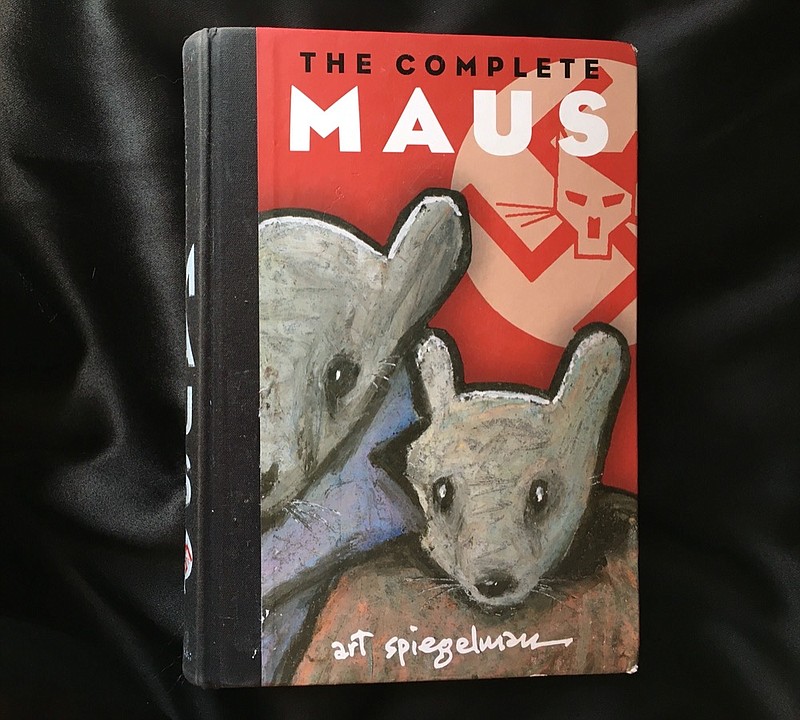The McMinn County Board of Education in Athens, Tennessee, this week finds itself amid a nationwide firestorm triggered by a unanimous vote earlier this month to remove the Pulitzer Prize-winning graphic novel on the Holocaust, "Maus: A Survivor's Tale" by Art Spiegelman, from its curriculum.
Officials cited obscenities and nudity. The book tells the story of the Holocaust with Nazis as cats and Jews as mice, but a human character, the author's mother, is shown naked in one drawing after committing suicide in a bathtub. "Maus" is about Spiegelman's father, who survived the Holocaust.
The timing of the decision and ensuing backlash came as Thursday marked International Holocaust Remembrance Day, a time for Holocaust survivors to reflect on and honor the lives of Europe's Jews, other victims and those who chose to help, according to the United States Holocaust Memorial Museum. The day marks the date in 1945 when Auschwitz was liberated.
(READ MORE: Whitwell, Tennessee's unlikely legacy: The Children's Holocaust Memorial turns 20)
On Jan. 10, McMinn County school board members tallied a 10-0 vote on the matter during a meeting called to discuss the book's place in the eighth-grade curriculum, saying it should be replaced with another book that doesn't contain anything deemed objectionable, according to board meeting minutes.
Officials at the board of education office said Director of Schools Lee Parkison was out of the office for the day on Thursday and was not expected to return. Board members did not respond to attempts to reach them seeking comment on the decision. The board's secretary issued a statement Thursday stating the board's position.
"The McMinn County Board of Education voted to remove the graphic novel 'Maus' from McMinn County Schools because of its unnecessary use of profanity and nudity and its depiction of violence and suicide," the statement said. "Taken as a whole, the board felt this work was simply too adult-oriented for use in our schools.
"We do not diminish the value of 'Maus' as an impactful and meaningful piece of literature, nor do we dispute the importance of teaching our children the historical and moral lessons and realities of the Holocaust. To the contrary, we have asked our administrators to find other works that accomplish the same educational goals in a more age-appropriate fashion," the statement continued. "The atrocities of the Holocaust were shameful beyond description, and we all have an obligation to ensure that younger generations learn of its horrors to ensure that such an event is never repeated."
During the Jan. 10 meeting, Parkison told board members the book contains "some rough, objectionable language," according to the meeting minutes. He said two or three board members had come by his office to discuss the matter.
"Being in the schools, educators and stuff, we don't need to enable or somewhat promote this stuff. It shows people hanging, it shows them killing kids," board member Tony Allman said. "Why does the educational system promote this kind of stuff? It is not wise or healthy."
The book depicts events during the Holocaust, the mass murder of six million European Jews and other groups by the Nazi Germans before and during World War II. Much of the violence - and many of the curse words - shown in the book are attributed to the perpetrators of genocide.
During the meeting, Parkison called on three of the school system's instructional supervisors - Julie Goodin, Melasawn Knight and Steven Brady - to talk about the curriculum and the book's role.
(READ MORE: Levine: Today's hate proves everything old is new again)
Goodin defended the book's place in the modern-day conversation about the Holocaust and its stark depiction of its horrors.
"I can talk of the history, I was a history teacher, and there is nothing pretty about the Holocaust, and for me, this was a great way to depict a horrific time in history," Goodin said.
Allman countered, saying that the language used in the book, if used by a student walking along a school hallway, would be a violation of the system's disciplinary policy.
"Are we teaching this and going against policy?" he asked.
"I think any time you are teaching something from history, people did hang from trees, people did commit suicide and people were killed, over six million were murdered," Knight said. "I think the author is portraying that because it is a true story about his father that lived through that. He is trying to portray that the best he can with the language that he chooses that would relate to that time, maybe to help people who haven't been in that aspect in time to actually relate to the horrors of it. Is the language objectionable? Sure. I think that is how he uses that language to portray that."
1/ Maus has played a vital role in educating about the Holocaust through sharing detailed and personal experiences of victims and survivors. On the eve of International #HolocaustRemembranceDay, it is more important than ever for students to learn this history.
— US Holocaust Museum (@HolocaustMuseum) January 27, 2022
Spiegelman on Thursday condemned the removal of his book in an interview on CNN and gave his impression of the McMinn County board decision.
"I've moved past total bafflement to trying to be tolerant of people who may possibly not be Nazis. Maybe?" he said. "Because having read the transcript of the school board meeting, the problem is sort of bigger and stupider than that. They really genuinely focused reading this 20-minute document, they're totally focused on some bad words that are in the book. Like, dammit, I can't believe that the word dammit would get the book jettisoned out of school on its own, but that's really where the genuine focus seemed to be."
Asked about the nudity, he said, "The nudity is specifically a small image that has my mother right after having slashed her wrists in a bathtub being found, so it's seen from overhead and you can see it's a tiny image. So you have to really, like, want to get your sexual kicks by projecting on it. It seems like a crazy place to get them. So I think that it has more to do with I think, they're so myopic in their focus, they're so afraid of what's implied and having to defend the decision to teach 'Maus' as part of the curriculum that it, it led to this kind of daffily myopic response.
"The problem, of course, is that it has the breath of autocracy and fascism about it."
'Maus' is no stranger to controversy. According to American Library Association Director of the Office for Intellectual Freedom Deborah Caldwell-Stone, the organization's database includes challenges to 'Maus' dating from the 1990s through 2015.
(READ MORE: Cleaveland: Comprehending the Holocaust through literature)
"We support the educators and school librarians who strive to provide their students with a full understanding of history through books and other resources and oppose the unreasoned censorship of classroom materials that illuminate historical tragedies like the Holocaust," Caldwell-Stone said in an email. "While we support the right of a parent to guide their student's reading and choose other resources for their student, we do not believe that one parent's views should control what books or educational resources are available to other students."
Spiegelman's book, published in 1980 and awarded the Pulitzer in 1992, provides a view of the Holocaust from a personal perspective, she said.
"'Maus' makes real one individual's personal experience of the horrors of the Holocaust while describing the political and social conditions that allowed mass genocide to happen in a manner that is accessible for young people - a retelling of history that supports not only the acquisition of historical knowledge but also empathy, understanding and critical thinking," she said. "The story is told in a manner that students describe as emotionally and intellectually engaging."
(READ MORE: Committee to address concerns about reading materials in Hamilton County schools)
Irven M. Resnick, professor and chair of excellence in the University of Tennessee at Chattanooga's Department of Philosophy and Religion, said he was stunned by the removal of 'Maus' from McMinn's curriculum.
"It's a travesty," Resnick said Thursday in a telephone interview. "I teach courses on the Holocaust at the university level and regularly ask my students to read 'Maus,' and without exception, I think it's their favorite introduction to the Holocaust," he said. "It gives them insight into the real experiences of Holocaust survivors but more importantly the experience of a child of Holocaust survivors and the impact the Holocaust has on the second generation which is often overlooked."
The Jewish Federation of Greater Chattanooga expressed disappointment in the decision to remove the book, according to an emailed statement from the local organization.
"It is imperative that we teach our children about the Holocaust in age-appropriate ways, as outlined in Tennessee's state standards for Holocaust education. At a time of rising antisemitism, we must be particularly vigilant so that nothing like the Holocaust can ever happen again," the statement said.
"On International Holocaust Memorial Day, in particular, we must redouble our efforts to ensure the crimes of the Nazi regime are never forgotten," the federation's executive director, Michael Dzik, said Thursday in the statement. "We are in the process of reaching out to the McMinn County School Board and look forward to discussing this issue with them in hopes that they will reconsider their decision."
Contact Ben Benton at bbenton@timesfreepress.com or 423-757-6569. Follow him on Twitter @BenBenton.

